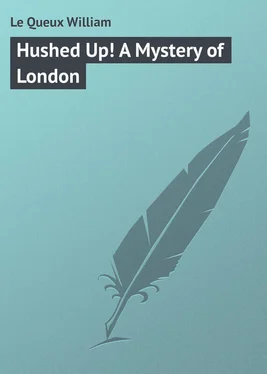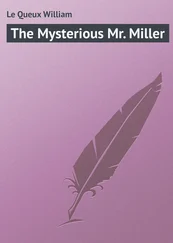William Le Queux - Hushed Up! A Mystery of London
Здесь есть возможность читать онлайн «William Le Queux - Hushed Up! A Mystery of London» — ознакомительный отрывок электронной книги совершенно бесплатно, а после прочтения отрывка купить полную версию. В некоторых случаях можно слушать аудио, скачать через торрент в формате fb2 и присутствует краткое содержание. Жанр: Классический детектив, foreign_detective, foreign_prose, на английском языке. Описание произведения, (предисловие) а так же отзывы посетителей доступны на портале библиотеки ЛибКат.
- Название:Hushed Up! A Mystery of London
- Автор:
- Жанр:
- Год:неизвестен
- ISBN:нет данных
- Рейтинг книги:5 / 5. Голосов: 1
-
Избранное:Добавить в избранное
- Отзывы:
-
Ваша оценка:
- 100
- 1
- 2
- 3
- 4
- 5
Hushed Up! A Mystery of London: краткое содержание, описание и аннотация
Предлагаем к чтению аннотацию, описание, краткое содержание или предисловие (зависит от того, что написал сам автор книги «Hushed Up! A Mystery of London»). Если вы не нашли необходимую информацию о книге — напишите в комментариях, мы постараемся отыскать её.
Hushed Up! A Mystery of London — читать онлайн ознакомительный отрывок
Ниже представлен текст книги, разбитый по страницам. Система сохранения места последней прочитанной страницы, позволяет с удобством читать онлайн бесплатно книгу «Hushed Up! A Mystery of London», без необходимости каждый раз заново искать на чём Вы остановились. Поставьте закладку, и сможете в любой момент перейти на страницу, на которой закончили чтение.
Интервал:
Закладка:
She only shrugged her shoulders, without any reply falling from her lips.
“Will you not take my advice and get back to England at once?” she asked very seriously, as she turned to me a few minutes later. “I have suggested this in your own interests.”
“But why should I go in fear of this unknown enemy?” I asked. “What harm have I done? Why should any one be my bitter enemy?”
“Ah, how do I know?” she cried in despair. “We all of us have enemies where we least suspect them. Sometimes the very friend we trust most implicitly reveals himself as our worst antagonist. Truly one should always pause and ponder deeply before making a friend.”
“You are perfectly right,” I remarked. “A fierce enemy is always better than a false friend. Yet I would dearly like to know what I have done to merit antagonism. Where has your father gone?”
“To Brescia, I believe – to meet his friends.”
“Who are they?”
“His business friends. I only know them very slightly; they are interested in mining properties. They meet at intervals. The last time he met them was in Stockholm a month ago.”
This struck me as curious. Why should he meet his business friends so clandestinely – why should they come at night in a car to cross-roads?
But I told her nothing of what I had witnessed. I decided to keep my knowledge to myself.
“The boat leaves at two o’clock,” she said, after a pause, her hand upon her breast as though to stay the wild beating of her heart. “Will you not take my advice and leave by that? Go to Milan, and then straight on to England,” she urged in deep earnestness, her big, wide-open eyes fixed earnestly upon mine.
“No, Miss Pennington,” I replied promptly; “the fact is, I do not feel disposed to leave here just at present. I prefer to remain – and to take the risk, whatever it may be.”
“But why?” she cried, for we were standing at the end of the terrace, and out of hearing.
“Because you are in need of a friend – because you have admitted that you, too, are in peril. Therefore I have decided to remain near you.”
“No,” she cried breathlessly. “Ah! you do not know the great risk you are running! You must go – do go, Mr. Biddulph – go, for — for my sake !”
I shook my head.
“I have no fear of myself,” I declared. “I am anxious on your behalf.”
“Have no thought of me,” she cried. “Leave, and return to England.”
“And see you no more – eh?”
“If you will leave to-day, I – I will see you in England – perhaps.”
“Perhaps!” I cried. “That is not a firm promise.”
“Then, if you really wish,” she replied in earnestness, “I will promise. I’ll promise anything. I’ll promise to see you in England – when the danger has passed, if – if disaster has not already fallen upon me,” she added in a hoarse whisper.
“But my place is here – near you,” I declared. “To fly from danger would be cowardly. I cannot leave you.”
“No,” she urged, her pale face hard and anxious. “Go, Mr. Biddulph; go and save yourself. Then, if you so desire, we shall meet again in secret – in England.”
“And that is an actual promise?” I asked, holding forth my hand.
“Yes,” she answered, taking it eagerly. “It is a real promise. Give me your address, and very soon I shall be in London to resume our acquaintanceship – but, remember, not our friendship. That must never be — never !”
CHAPTER FOUR
THE PERIL BEYOND
My taxi pulled up before my own white-enamelled door in Wilton Street, off Belgrave Square, and, alighting, I entered with my latch-key.
I had been home about ten days – back again once more in dear, dirty old London, spending most of my time idling in White’s or Boodle’s; for in May one meets everybody in St. James’s Street, and men foregather in the club smoking-room from the four ends of the earth.
The house in Wilton Street was a small bijou place which my father had occupied as a pied-à-terre in town, he being a widower. He had been a man of artistic tastes, and the house, though small, was furnished lightly and brightly in the modern style. At Carrington he always declared there was enough of the heaviness of the antique. Here, in the dulness of London, he preferred light decorations and modern art in furnishing.
Through the rather narrow carpeted hall I passed into the study which lay behind the dining-room, a small, cosy apartment – the acme of comfort. I, as a bachelor, hated the big terra-cotta-and-white drawing-room upstairs. When there, I made the study my own den.
I had an important letter to write, but scarcely had I seated myself at the table when old Browning, grave, grey-faced and solemn, entered, saying —
“A clergyman called to see you about three o’clock, sir. He asked if you were at home. When I replied that you were at the club, he became rather inquisitive concerning your affairs, and asked me quite a lot of questions as to where you had been lately, and who you were. I was rather annoyed, sir, and I’m afraid I may have spoken rudely. But as he would leave no card, I felt justified in refusing to answer his inquiries.”
“Quite right, Browning,” I replied. “But what kind of a man was he? Describe him.”
“Well, sir, he was rather tall, of middle age, thin-faced and drawn, as though he had seen a lot of trouble. He spoke with a pronounced drawl, and his clerical coat was somewhat shabby. I noticed, too, sir, that he wore a black leather watch-guard.”
That last sentence at once revealed my visitor’s identity. It was the Reverend Edmund Shuttleworth! But why had he returned so suddenly from Riva? And why was he making secret inquiry concerning myself?
“I think I know the gentleman, Browning,” I replied, while the faithful old fellow stood, a quaint, stout figure in a rather tight-fitting coat and grey trousers, his white-whiskered face full of mystery. I fancy Browning viewed me with considerable suspicion. In his eyes, “young Mr. Owen” had always been far too erratic. On many occasions in my boyhood days he had expressed to my father his strong disapproval of what he termed “Master Owen’s carryings-on.”
“If he should call again, tell him that I have a very great desire to renew our acquaintance. I met him abroad,” I said.
“Very well, sir,” replied my man. “But I don’t suppose he will call again, sir. I was rude to him.”
“Your rudeness was perfectly justifiable, Browning. Please refuse to answer any questions concerning me.”
“I know my duty, sir,” was the old man’s stiff reply, “and I hope I shall always perform it.”
And he retired, closing the door silently behind him.
With my elbows upon the table, I sat thinking deeply.
Had I not acted like a fool? Those strange words, and that curious promise of Sylvia Pennington sounded ever in my ears. She had succeeded in inducing me to return home by promising to meet me clandestinely in England. Why clandestinely?
Before me every moment that I now lived arose that pale, beautiful face – that exquisite countenance with the wonderful eyes – that face which had held me in fascination, that woman who, indeed, held me now for life or death.
In those ten days which had passed, the first days of my home-coming after my long absence, I knew, by the blankness of our separation – though I would not admit it to myself – that she was my affinity. I was hers. She, the elegant little wanderer, possessed me, body and soul. I felt for her a strong affection, and affection is the half-and-half of love.
Why had her friend, that thin-faced country clergyman, called? Evidently he was endeavouring to satisfy himself as to my bona fides . And yet, for what reason? What had I to do with him? She had told me that she owed very much to that man. Why, however, should he interest himself in me?
Читать дальшеИнтервал:
Закладка:
Похожие книги на «Hushed Up! A Mystery of London»
Представляем Вашему вниманию похожие книги на «Hushed Up! A Mystery of London» списком для выбора. Мы отобрали схожую по названию и смыслу литературу в надежде предоставить читателям больше вариантов отыскать новые, интересные, ещё непрочитанные произведения.
Обсуждение, отзывы о книге «Hushed Up! A Mystery of London» и просто собственные мнения читателей. Оставьте ваши комментарии, напишите, что Вы думаете о произведении, его смысле или главных героях. Укажите что конкретно понравилось, а что нет, и почему Вы так считаете.












